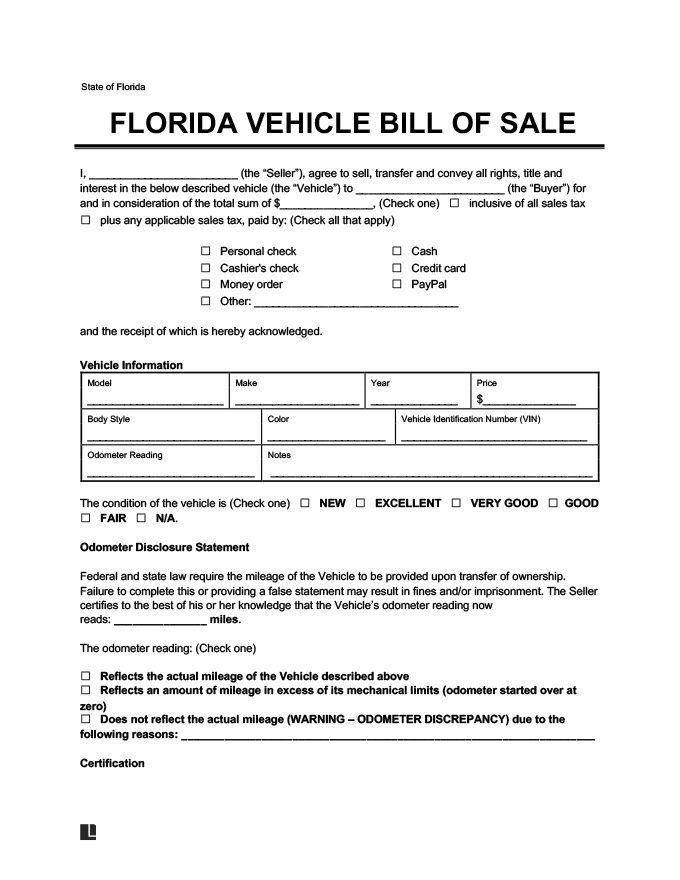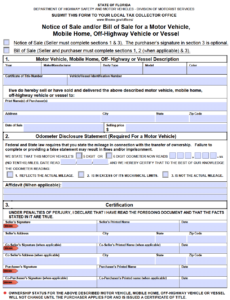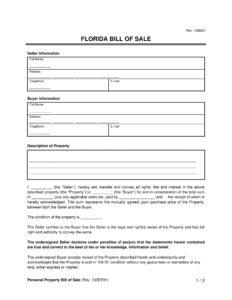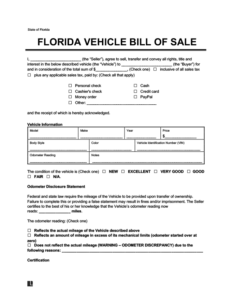Buying or selling a car in the Sunshine State is an exciting venture, whether you are upgrading your ride or passing on a beloved vehicle to a new owner. Amidst all the excitement, it is easy to overlook some of the crucial paperwork involved. However, one document stands out as absolutely essential for both parties to ensure a smooth, legal, and hassle-free transfer of ownership: the bill of sale.
This vital record acts as a binding agreement and proof of transaction, protecting both the buyer and the seller from potential future disputes. Having a properly executed bill of sale clarifies the terms of the sale, the vehicle’s condition, and the agreed-upon price, making the entire process transparent and legally sound.
Why You Absolutely Need a Florida Automobile Bill of Sale
When you are involved in a private vehicle transaction in Florida, a bill of sale isn’t just a formality; it’s a cornerstone of the entire process. While the state of Florida itself does not always mandate a bill of sale for title transfers between private parties, having one is highly recommended and often considered a best practice for liability and record-keeping purposes. It serves as concrete evidence of the sale, detailing the date of transfer, the agreed price, and the condition of the vehicle at the time of sale. This documentation is invaluable for both the seller who needs to prove they no longer own the vehicle, and the buyer who needs proof of purchase for registration and title application.

For the seller, a completed bill of sale is crucial for limiting future liability. Once the car is sold and the document is signed, it formally transfers ownership, protecting you from responsibility for any accidents, parking tickets, or other issues that might occur after the sale. It also helps in notifying the Florida Department of Highway Safety and Motor Vehicles (FLHSMV) that the vehicle is no longer under your name, which can be important for removing it from your insurance policy and vehicle registration records. Without this clear documentation, you might find yourself entangled in problems even after you’ve handed over the keys.
From the buyer’s perspective, the bill of sale is your proof of purchase. This document will be critical when you head to the local DMV or tax collector’s office to register the vehicle and apply for a new title. It establishes your legal ownership and confirms the details of the transaction, which helps prevent any misunderstandings or disputes down the line. It verifies the vehicle identification number (VIN), odometer reading, and other key details that are necessary for accurate registration. Using a comprehensive florida automobile bill of sale template ensures all necessary information is captured, providing peace of mind.
Ultimately, the bill of sale acts as a protective shield for both parties. It provides a clear, written record that can be referenced if any questions or disputes arise regarding the sale terms, the vehicle’s condition, or the transfer date. This simple document can save you a lot of headaches and legal complications in the future, making the small effort of preparing it well worth the time.
Key Details to Include in Your Bill of Sale
- Full names and addresses of both the buyer and the seller.
- Detailed description of the vehicle, including make, model, year, and vehicle identification number (VIN).
- The current odometer reading at the time of sale.
- The agreed-upon purchase price.
- The date of the transaction.
- Signatures of both the buyer and the seller.
- (Optional but recommended) A statement regarding the vehicle’s “as-is” condition, if applicable.
How to Fill Out and Use Your Bill of Sale Effectively
Utilizing a reliable florida automobile bill of sale template simplifies the process immensely. You can often find free templates online from reputable sources, including government websites or legal forms providers. Once you have your chosen template, the next step is to gather all the necessary information for both the buyer and the seller, as well as the vehicle itself. This includes full legal names, current addresses, the vehicle’s make, model, year, color, and most importantly, its Vehicle Identification Number (VIN) and current odometer reading. Accuracy in these details is paramount to avoid any issues during title transfer and registration.
Before meeting to finalize the sale, it’s a good idea for both parties to review the template and understand what information will be required. This proactive approach helps to ensure a smooth and efficient transaction on the day of the sale. When filling out the form, be sure to write clearly and legibly, or if using a digital template, type in all the details precisely. Double-check all numbers, especially the VIN and odometer reading, as these are critical for official records. Any discrepancies could lead to delays or complications with the FLHSMV.
Once all the information has been accurately entered, both the buyer and the seller must sign the bill of sale. It’s advisable to sign in the presence of each other, and some people even opt to have their signatures notarized, although this is not a mandatory requirement for private vehicle sales in Florida. Notarization simply adds an extra layer of authenticity to the document, providing additional peace of mind. After signing, make sure to make at least two identical copies: one for the buyer to take to the DMV for registration and title transfer, and one for the seller to keep for their personal records.
Keeping a copy of the bill of sale is vital for both parties. For the seller, it serves as proof that the vehicle has been sold, helping to release them from liability and to cancel insurance. For the buyer, it is essential for vehicle registration, obtaining new license plates, and applying for the vehicle’s title. Losing this document could lead to significant bureaucratic hurdles. Therefore, store your copy in a safe and accessible place, along with other important vehicle documents.
Ensuring a Smooth Transaction
Having a properly prepared bill of sale makes the entire process of transferring vehicle ownership straightforward and transparent for everyone involved. It eliminates guesswork and provides a clear record of the agreement, fostering trust between buyer and seller. This simple act of documentation can save a considerable amount of time and effort, preventing potential future headaches.
By taking the time to complete a detailed and accurate bill of sale, you are taking a proactive step to protect your interests and ensure compliance with best practices for vehicle transactions in Florida. This attention to detail will lead to a more efficient process at the DMV and provide both parties with lasting peace of mind that their vehicle exchange was handled professionally and legally.



